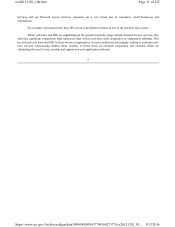Tucows 2015 Annual Report Download - page 21
Download and view the complete annual report
Please find page 21 of the 2015 Tucows annual report below. You can navigate through the pages in the report by either clicking on the pages listed below, or by using the keyword search tool below to find specific information within the annual report.
As an MVNO, Ting is dependent on two major network operators for their wireless networks and any disruptions of
Ting’s use of such networks may adversely affect its business and financial results.
As an MVNO, we do not own or operate a physical network, but rather utilize the nationwide wireless
communication networks of two major mobile Network Operators (“Network Operators”). To be successful, we will need
to continue to provide our customers with reliable service over their nationwide wireless communication networks. We
rely on them and their third-party affiliates to maintain their wireless facilities and government authorizations and to
comply with government policies and regulations. If they fail to do so, we may incur substantial losses. Delays or failure to
add network capacity, or increased costs of adding capacity or operating the network, could limit our ability to increase our
customer base, limit our ability to increase our revenues, or cause a deterioration of our operating margin. Some of the
risks related to their nationwide wireless communication networks and infrastructure include: major equipment failures,
breaches of network or information technology security that affect their wireless networks, including transport facilities,
communications switches, routers, microwave links, cell sites or other equipment or third-party owned local and long-
distance networks on which we rely, power surges or outages, software defects and disruptions beyond their control, such
as natural disasters and acts of terrorism, among others. The Master Services Agreements “MSA” with our Network
Operators does not contain any contractual indemnification provisions relating to network outages or other disruptions.
Any impact on their nationwide wireless communication networks could disrupt Ting’s operations, require significant
resources, result in a loss of subscribers or impair our ability to attract new subscribers, which in turn could have a material
adverse effect on our business, results of operations and financial condition.
We are dependent on technology used by our Network Operators. Wireless communications technology is
evolving rapidly. A significant change in current wireless network technologies or the emergence of alternative
technologies could reduce significantly our ability to offer a full range of data services, as compared to our competitors. If
our Network Operators fail to keep up with these changes, we may lose customers or may not be able to attract new
customers.
If our Network Operators terminate or determine that they do not wish to renew their Master Services Agreements
on expiration for any reason, we may be unable to obtain the wireless services necessary to operate our business. In
addition, transition to an alternative provider may be limited to a provider with a CDMA or GSM network as certain of our
handsets are not capable of operating on all networks. Such a transition could be time-consuming and costly and we could
lose a substantial number of customers during the transition period.
Our dependence on our Network Operators is not limited to our use of their nationwide networks. We rely on
them and their third-party affiliates for other critical operational matters, including:
●continued expansion and improvement of their nationwide networks and their third-party affiliates’
networks, which is expected to require additional investment;
●deployment of upgrades and maintenance of their nationwide networks;
●maintenance by our Network Operators of their relationships with their third-party affiliates;
●maintenance by our Network Operators and their third-party affiliates of FCC authorizations in good
standing;
●integration of new services into their nationwide networks;
●certification of new handsets for use on their nationwide networks;
●compliance with FCC, state E911 and other regulatory requirements;
●obtaining telephone numbers;
Page 21 of 22
5
tcx20151201_10k.ht
m
9
/
13
/
201
6
https://www.sec.gov/Archives/edgar/data/909494/000143774916027177/tcx20151201_10...
























